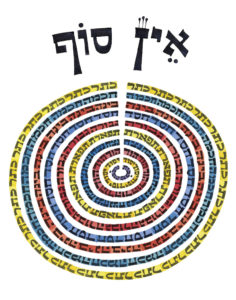For Kabbalists, the visible world is only the superficial skin of Reality. Because of the way our minds are constructed to interact with the world, we imagine ourselves as separate selves, going about our business, trying to be happy. In fact, we, the stars, our friends and enemies, and everything around us — all of us are dreams in the mind of God. Nothing has any separate reality — it only looks like there are separate tables, chairs, computers, and people from a certain, limited perspective. Being in itself is actually nothing but God.
From God’s point of view, all of the distinctions we make — between ourselves and the world outside ourselves, among objects in the world, etc. — are completely illusory, because ultimately there is only the und

ifferentiated unity of the ein sof, the Infinite.
Of course, this is not how things look from our point of view. Why is this the case? And how do you know that everything is really one?
Let’s pause for a moment, before answering those questions, for a “reality check.” For most of us today, the concept of God is a problematic and controversial one. I’ve taught Kabbalah to adults, adolescents, Jews, non-Jews, and I’ve noticed that the large majority of my students, when they hear the word “God,” seem to say “hold on — you’ve lost me.” So, as soon as someone mentions “God,” we go off on a tangent.
For most Kabbalists, the situation was very different. The concept and reality of God were felt and known from their earliest memories. These were, by and large, rabbis soaked in the God of Judaism, which they experienced and related to all the time; traditional Jewish practice puts one in constant relationship with God. So, that important [hold on,] that question of how we intellectually know that God exists is itself a somewhat non-Kabbalistic question. The kind of knowledge we are looking for is experiential knowledge. Not knowledge on faith or dogma, but knowledge based on first-hand experience. This is called da’at — true knowledge. The kind lovers have. Union.
For this reason, the Kabbalah is more interested in how we relate to God via symbols, concepts, and emanations than how we can speculate about the undifferentiated Ein Sof. In particular, it asks how we know God through the concepts of the [sefirot], or how we unite with God through meditation, or how we can use our relationships with God for various purposes. The Kabbalah is also not a philosophical system. In fact, historically, much of the Kabbalah arose directly in response (and opposition) to rationalist philosophy. So we will not find systematic “proofs” of God’s existence in the Zohar or anywhere else. Really, if such proofs existed, wouldn’t you already know them by now anyway?
Since, for the Kabbalah, the Infinite — the ein sof — is utterly different from what most people call “God,” many contemporary teachers choose not to use the word “God” at all. This might be a good idea. After all, let’s look at two short texts from one of the most important Kabbalists, Rabbi Moshe Cordovero, as translated by scholar Daniel Matt:
An impoverished person thinks that God is an old man with white hair, sitting on a wondrous throne of fire that glitters with countless sparks, as the Bible states: “The Ancient-of-Days sits, the hair on his head like clean fleece, his throne–flames of fire.” Imagining this and similar fantasies, the fool corporealizes God. He falls into one of the traps that destroy faith. His awe of God is limited by his imagination.But if you are enlightened, you know God’s oneness; you know that the divine is devoid of bodily categories — these can never be applied to God. Then you wonder, astonished: Who am I? I am a mustard seed in the middle of the sphere of the moon, which itself is a mustard seed within the next sphere. So it is with that sphere and all it contains in relation to the next sphere. So it is with all the spheres — one inside the other — and all of them are a mustard seed within the further expanses. And all of these are a mustard seed within further expanses.
Your awe is invigorated, the love in your soul expands.
This is a remarkable teaching. Of course, Cordovero uses his scientific framework — the idea that the universe is comprised of concentric spheres — instead of ours. But the principle is the same. God is not some old man in the sky who makes sure that only good things happen to good people, and bad things happen to bad. The universe doesn’t work that way. In fact, the universe is inconceivably vast, and every subatomic particle of it is filled with God. Here’s another important Cordovero text about the God idea:
The essence of divinity is found in every single thing — nothing but it exists…. Do not attribute duality to God. Let God be solely God. If you suppose that Ein Sof emanates until a certain point, and that from that point on is outside of it, you have dualized. God forbid! Realize, rather, that Ein Sof exists in each existent. Do not say, “This is a stone and not God.” God forbid! Rather, all existence is God, and the stone is a thing pervaded by divinity.
Think about it. “Ein Sof” means infinite — really infinite. If this computer screen is not the Ein Sof, we’ve made a mistake, because we’ve given the Ein Sof a sof — an end. Kabbalists take the idea of infinity very seriously. God is that which Is — YHVH, one of the main Hebrew terms for this Reality, might even be translated “Is.” God is not an old man; God is What Is. The Infinite is everything. It is the only thing.
“God” is an imprecise name for the only thing in the universe that actually exists.